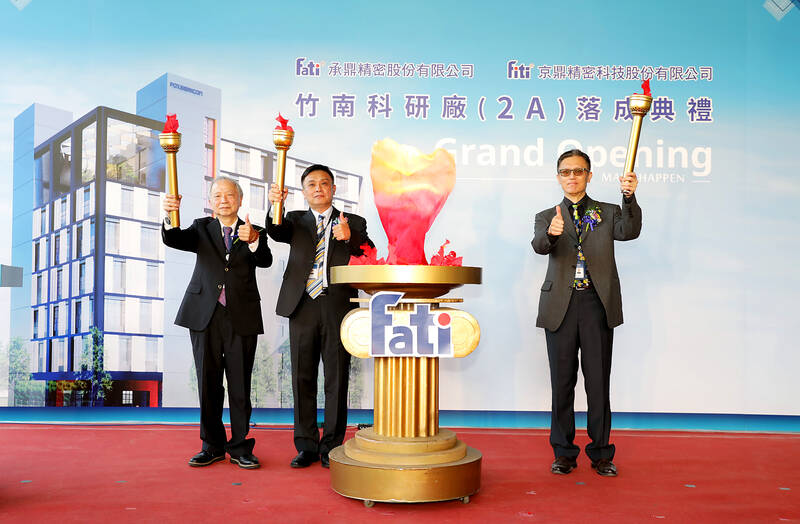Foxsemicon Integrated Technology Inc (京鼎) yesterday said its new factory had entered operation and would generate NT$3 billion (US$95.15 million) in production value at full utilization.
The semiconductor equipment component manufacturing arm of Foxconn Technology Group (富士康科技集團) in January invested NT$2.4 billion to build the fab in Miaoli County’s Jhunan Township (竹南) amid a thriving semiconductor industry worldwide.
The new factory is expected to create 400 new jobs, Foxsemicon said in a statement.

Photo courtesy of Foxsemicon Integrated Technology Inc
Although the world’s memorychip industry in the past few months started showing some weakness amid sagging demands for PCs and smartphones, Foxsemicon expects the semiconductor equipment sector’s growth not to be dented by the trend.
Demands for semiconductors used in artificial intelligence, 5G devices, high-performing computing applications and electric vehicles remain robust, company spokesman Frank Chen (陳鎮福) told the Taipei Times by telephone.
The world’s major chipmakers, including memorychip makers, are still building new factories and expanding capacity to capture future growth, he said.
“The semiconductor equipment supply chain has not felt the chill of winter yet,” Chen said.
The world’s major semiconductor equipment suppliers, such as Applied Materials Inc and Lam Research Corp, are unable to keep pace with customers’ demand, as the COVID-19 pandemic and other factors weighing on logistics lengthen lead times, he said.
Foxsemicon counts Applied Materials as one of its customers, the company’s annual report said.
The world’s fab equipment spending is expected to grow about 9 percent annually to an all-time high of US$99 billion this year, with Taiwanese firms topping the equipment spending list, international trade group SEMI said last week.
SEMI also forecast that global spending on semiconductor equipment next year would remain in high gear at about US$97 billion.
“We retain our forecast of double-digit percentage [revenue] growth in the full year. So far we have performed better than that,” Chen said.
The Miaoli-based company saw revenue soar 18.9 percent to NT$9.26 billion in the first eight months of this year, compared with NT$7.79 billion in the same period last year.
Foxsemicon said that its local fabs and capacity help it boost supply resilience amid global geopolitical tensions and pandemic restrictions.
The stock price of Foxsemicon rallied 1.57 percent to NT$193.5 yesterday, outperforming the TAIEX, which gained 0.66 percent, Taiwan Stock Exchange data showed.

Semiconductor shares in China surged yesterday after Reuters reported the US had ordered chipmaking giant Taiwan Semiconductor Manufacturing Co (TSMC, 台積電) to halt shipments of advanced chips to Chinese customers, which investors believe could accelerate Beijing’s self-reliance efforts. TSMC yesterday started to suspend shipments of certain sophisticated chips to some Chinese clients after receiving a letter from the US Department of Commerce imposing export restrictions on those products, Reuters reported on Sunday, citing an unnamed source. The US imposed export restrictions on TSMC’s 7-nanometer or more advanced designs, Reuters reported. Investors figured that would encourage authorities to support China’s industry and bought shares

TECH WAR CONTINUES: The suspension of TSMC AI chips and GPUs would be a heavy blow to China’s chip designers and would affect its competitive edge Taiwan Semiconductor Manufacturing Co (TSMC, 台積電), the world’s biggest contract chipmaker, is reportedly to halt supply of artificial intelligence (AI) chips and graphics processing units (GPUs) made on 7-nanometer or more advanced process technologies from next week in order to comply with US Department of Commerce rules. TSMC has sent e-mails to its Chinese AI customers, informing them about the suspension starting on Monday, Chinese online news outlet Ijiwei.com (愛集微) reported yesterday. The US Department of Commerce has not formally unveiled further semiconductor measures against China yet. “TSMC does not comment on market rumors. TSMC is a law-abiding company and we are

FLEXIBLE: Taiwan can develop its own ground station equipment, and has highly competitive manufacturers and suppliers with diversified production, the MOEA said The Ministry of Economic Affairs (MOEA) yesterday disputed reports that suppliers to US-based Space Exploration Technologies Corp (SpaceX) had been asked to move production out of Taiwan. Reuters had reported on Tuesday last week that Elon Musk-owned SpaceX had asked their manufacturers to produce outside of Taiwan given geopolitical risks and that at least one Taiwanese supplier had been pushed to relocate production to Vietnam. SpaceX’s requests place a renewed focus on the contentious relationship Musk has had with Taiwan, especially after he said last year that Taiwan is an “integral part” of China, sparking sharp criticism from Taiwanese authorities. The ministry said

US President Joe Biden’s administration is racing to complete CHIPS and Science Act agreements with companies such as Intel Corp and Samsung Electronics Co, aiming to shore up one of its signature initiatives before US president-elect Donald Trump enters the White House. The US Department of Commerce has allocated more than 90 percent of the US$39 billion in grants under the act, a landmark law enacted in 2022 designed to rebuild the domestic chip industry. However, the agency has only announced one binding agreement so far. The next two months would prove critical for more than 20 companies still in the process